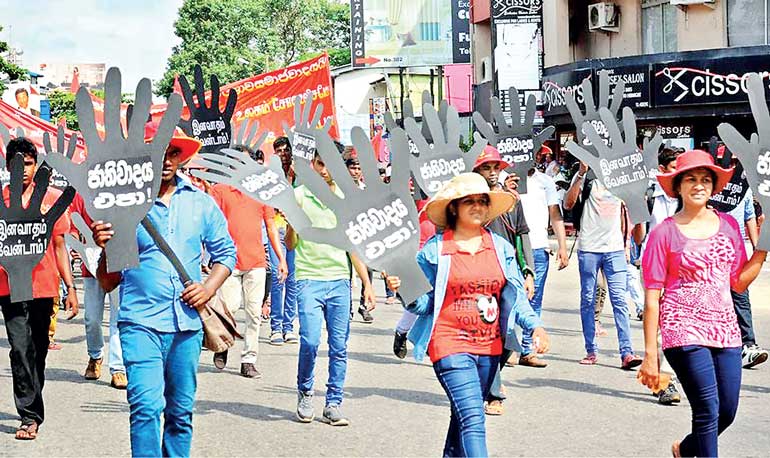Sunday Feb 15, 2026
Sunday Feb 15, 2026
Saturday, 30 April 2016 00:00 - - {{hitsCtrl.values.hits}}

“Lord, what fools these mortals be...” Midsummer Night’s Dream.
Puck, in the Shakespearean comedy Midsummer Night’s Dream, thought that we mortals are fools. Had he had the benefit of observing the tragi-comedy of our May Day rallies he may well have used a stronger word than that
 Whatever the disputed number or density of bodies at the different rallies held to commemorate the workers’ day, one thing is certain; on May Day, all the meetings added up, there will be a good million Sri Lankans marching, shouting themselves hoarse in the burning sun.
Whatever the disputed number or density of bodies at the different rallies held to commemorate the workers’ day, one thing is certain; on May Day, all the meetings added up, there will be a good million Sri Lankans marching, shouting themselves hoarse in the burning sun.
If the climate prevailing now holds, it will not be their ally, tormenting the weary marchers with a sweltering day of extreme humidity. After all the sound and fury, the day will end like most their days, bone weary, hollow, signifying nothing.
They have been marching from pre-independence days, going back to early 1930s, when A.E. Gunasinghe led the labour movement. In 1935 came the left parties, giving more militancy to the parades in line with the ideology of class conflict. So backward was our economic/social development, this was nearly a century after the publication of the epoch making Communist Manifesto in 1848, a stirring call to arms by the then 30 year old Karl Marx.
“The proletarians have nothing to lose but their chains. They have a world to gain. Working men of all countries, unite!” was the clarion call.
Whole new world
With colonisation came a whole new world of ideas and ways of thinking. But things can be studied, copied or imitated and yet remain foreign, partially perceived and only imperfectly understood. It is good for all concerned to have competing businesses. But the idea of competition, if interpreted wrongly, could lead to the ruin of all.
In Sri Lanka, you open a kindergarten, the next day there will be another, and yet another, opening right next door. Inevitably the idea becomes meaningless, losing all credibility, the process leading to mutual destruction.
Even when it came to May Day rallies, before long, every political party began to stage their own. In some instances, particularly in the estate sector, large-scale employers also led the workers unions! The political clout that the unions gave them allowed them to acquire more economic power, enabling them to command still more political power. Now, this self-serving cycle would apply to most politicians addressing the rallies on May Day.
 Class struggles
Class struggles
Arguably, in some form or the other, we are all workers. No one just vegetates. Even to meditate, one must use human faculties. The politician, the judge, the doctor, the architect; they are all workers, presumably more intellectual than physical. But that is not what Marx meant. It is in relation to the means of production that the class is defined.
“The history of all hitherto existing society is the history of class struggles. Freeman and slave, patrician and plebian, lord and serf, guild – master and journeyman, in a word, oppressor and oppressed stood in constant opposition to one another, carried on an uninterrupted, now hidden, now open fight, a fight that each time ended, either in a revolutionary reconstitution of society at large, or in the common ruin of the contending classes.”
The bourgeois proved to be a much harder nut to crack than Marx anticipated. Combined with liberal democracy, the free enterprise system has given its citizens a standard of living and a sense of freedom far superior to anything enjoyed hitherto. Contrary to the anticipated mass impoverishment, the efficiencies of the system have opened up a prospect of plenty while making it possible to enjoy more leisure than was possible in any other epoch.
The average worker in the Developed world perhaps leads a life style far superior to a rich man in a poor country. In the everyday services like education, health, transport he could assume a standard, which will only be a rare exception in a poor country. His supermarkets will carry the best of foods. His bakery will produce the best of bread. He could travel freely. He may take for granted the sense of well-being and security that a rich and orderly society provides.
Quite justifiably, these countries could tell the putative socialist States like China and Vietnam that ‘imitation is the sincerest form of flattery”. Meanwhile, the more hard-line North Korea, while mouthing Marxist slogans, has degenerated into a derelict torture chamber run by the founders’ family.
Capitalism
In our little country, capitalism was late in coming. Both the Dutch and the British only promoted a non-industrial type of capitalism in the form of plantations. Even today our industrial base is small and relatively backward.
Whatever industry that has been established are by and large those using the lower range of technology, supported by a high in-put of labour. These are industries which are relatively easy to get in to; competition is high, margins low and extremely vulnerable to market fluctuations.
The advance working class Marx was writing about hardly exists here. In terms of productivity, whether it is the plantations, rice paddies or the factories we lag behind. To put it in another way, per person, our workers are definitely not among the most productive.
On the other side of the divide, the so-called capitalist in the country, owe their success to either a crime or unashamed cronyism. There is no businessman who can claim success without having had political patronage. With the political swings, his fortunes also rise and fall. Among the local entrepreneurs one sees little creativity or innovation, imitation and copying being the easy way to do business. By all accounts, corruption, bribery and commissions form the essence of our business methods.
The political establishment
We then go to the leaders, the political establishment. Since 1948, we have never achieved the sustained rate of economic growth that enabled newly-industrialised countries to break the shackles of poverty. Under their watch, there is no institution which has not been degraded, nor is there a service which can claim to be superior to what was say thirty years ago, leave alone international standards.
Reflective of a deep rooted feudalism, their governance style is more ceremonious than being effective and target oriented. The long drawn out religious ceremonies that precede any public function, when there is not a jot of spirituality in them, tells the story. It is with the form of governance they are preoccupied with; mode of address, method of approach; not the substance thereof. With no past performance to talk of, little to show for the present, it is in the art of drawing a rosy future they thrive at.
Salvation will come with the next constitution, a new law to be passed or an agreement with a foreign agency to be signed. Everything is airy fairy, a bluff to fob off the anxious public, while they just carry on, concentrating on self-enrichment, consolidating their position and taking care of the future careers of kith and kin. Meanwhile, crisis to crisis we go, insurrections, separatist movements, riots, to constant unrest standing starkly before a background of economic stagnation; an uninspiring tale in a region with many inspiring stories.
The workers will march
Like all the previous years, once again, the workers will march on this May Day too.
They will be summoned by a political busybody, packed into a hot uncomfortable bus, given a packet of rice, some money; perhaps a cup or two of a cheap alcohol and that will be called a political action.
In their perception, so humble is the position they occupy in the universe, they will not be heard to say to the busybody ‘Sorry, on this day I have children to attend to, family matters to take care of, a house to repair, a book to read, an education to follow, a hobby to indulge in….’
Puck, in the Shakespearean comedy Midsummer Night’s Dream, thought that we mortals are fools. Had he had the benefit of observing the tragi-comedy of our May Day rallies he may well have used a stronger word than that.